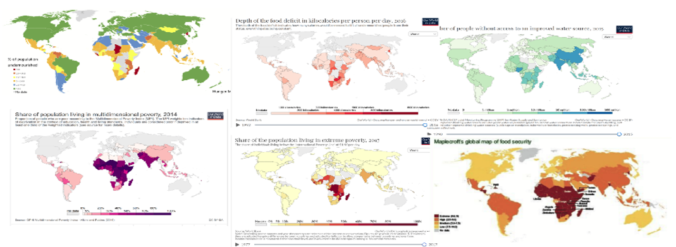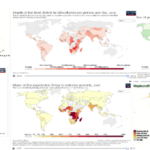“To accomplish great things, we must not only act, but also dream; not only plan, but also believe.”
“It is well for the heart to be naïve and for the mind not to be.“
Anatole France
THE GOOD INTENTION
Leaving no-one behind is the “transformative promise” of the SDGs. It has become a mantra in development planning. It is everywhere, invading discussions, plans and interventions with a raft of good intentions. It has even developed into an acronym, a sure sign of having arrived in a world awash with short forms of speech. It is a persuasive argument that unless those worst off see their lives dramatically improved, we cannot claim that the SDGs have been met:
“As we embark on this great collective journey, we pledge that no-one will be left behind. Recognising that the dignity of the human person is fundamental, we wish to see the Goals and targets met for all nations and peoples and for all segments of society. And we will endeavour to reach the furthest behind first.” (my emphasis)
And:
“By 2030, empower and promote the social, economic and political inclusion of all, irrespective of age, sex, disability, race, ethnicity, origin, religion, or economic or other status.”
Governments and those engaged in development everywhere feel compelled to attend to it, and over the past five years evaluators, evaluation thinkers and evaluation commissioners have had this notion firmly in their line of sight. Speakers in conferences and webinars continue to ponder on how best to help ensure NOLB through evaluative practice. Discussion documents, guidelines and evaluations with a NOLB focus have proliferated, giving hope and showing strong commitment to the intent in spite of the challenge of moving from rhetoric to action.
THE PROBLEM
In their thoughtful 2019 book, Leave no-one behind: Time for specifics on the SDGs, Homi Kharas and his co-authors bring together many perspectives and experiences applied to different NOLB foci – gender, poverty, farmers, refugees and migrants, education, health care and more. Like so many articles and reports, they offer insights and recommendations on what can be done. They also eloquently point out the scale of the challenge, and the countries most deeply affected.
The key point? The countries where NOLB is of greatest concern, where most of the interventions are concentrated, are all in the Global South, that part of the world in shades of red or some other vibrant “this is bad” colour in just about every map that visualises data on the state of the world, where everything to do with development is more challenging, more resource-intensive, and a greater burden on governments and others who want to make a difference.
This means that the burden of supporting and sustaining a majority of ‘leaving no-one behind’ efforts fall inevitably on many of the poorest (low-income) countries in the Global South.
The problem is that they cannot afford it, nor can they sustain it.
It will therefore be unfair to hold such countries accountable for ‘leaving no-one behind’ strategies.
THE ETHICS OF ‘LEAVING NO-ONE BEHIND’
There are two sides to the ethical imperative for ‘leaving no-one behind’.
It is unethical to keep on neglecting the most vulnerable and those on the margins of society. It is equally unethical to intervene with time-bound interventions to ‘leave no-one behind’ when they have very little chance of being sustained once the source of financing leaves. This causes too much destruction of societal systems, too much hope that is created and then shattered, too much behaviour that is changed temporarily without thinking of the long-term, often negative consequences.
There is the need to dream, to have spectacular ambitions. But there is also the need for pragmatism among those engaged with development as well as those who evaluate for it.
As Oumoul Ba Tal from Mauritania, a former President of the African Evaluation Association, once said in a heated exchange with a senior evaluation specialist from an international agency:
“It is not about your project; it is about my country”.
THE NEED FOR PRAGMATISM
The pressure to achieve the SDGs means that aid agencies inevitably have a focus on no-one left behind. Authorities in the Global South also feel compelled to attend it as a priority. It is a fact that this type of focus resonates well with all of us. Development and evaluation specialists are at heart most often idealists who want to help to make the world a better place. Aiming to ensure that no-one gets left behind appears to be a noble part of what we can do at this time in the world. It has become soft-on-the-ear-and-mind rhetoric, something to be done because it sounds and feels right.
But from a pragmatic perspective, if we really want to see development that is effective and that sustains, and that eventually succeeds in leaving no-one behind, we have to consider the following:
One, the level of cost and effort matter. In some countries ‘no-one left behind’ relates to the urban-rural divide; in others to the invisibility everywhere of the poorest of the poor, the most marginalised, the most neglected; in others to those displaced or victims of war. Those left behind typically present a ‘last mile’ problem that is always much more costly in terms of effort, resources and time – and even much more so in low-income or ‘least developed’ countries where whole systems need to co-evolve to ensure a positive development trajectory over a long period. It becomes even more problematic if the intent is to address first those who would qualify as most marginalised or vulnerable, as the 2030 Agenda for Sustainable Development and even the recently released guidance for the revised DAC criteria both suggest. This is a highly undesirable approach, also for the reasons that follow.
Two, sustainability matters. Development projects and programmes tend to be terminated after three or five or perhaps ten years, often without having achieved much. In low-income countries the chance that even well-crafted and implemented interventions aimed at ensuring no-one is left behind will sustain is highly unlikely without a massive, intensive effort over a significant period. Once aid agencies leave, local actors have to pick up the pieces – something that is incredibly difficult to do in the often fragile, resource-constrained contexts in much of the Global South.
Three, long-term development trajectories matter. Countries that are already well advanced on a positive development trajectory – where many vectors or indicators of national progress move in desired directions, where many institutional and other systems have already advanced and reached some form of reasonable stability – will find it much easier to make the ‘last mile’ no-one left behind effort. This is why China, despite its extraordinarily rapid economic development, waited until recently before focusing on eradicating extreme poverty in rural areas.
Four, dealing with choices and trade-offs matter. If a low income country starts to move along a positive development trajectory, trade-offs will be required. One of them is that some will have to be left behind, until infrastructure and institutional systems, societal relationships and capacities have evolved to a stage where there is enough to support and sustain the development of those who are most marginalised and vulnerable. What is important is how carefully and systematically inequalities are uncovered through evaluative practices, and managed and slowly woven into strategies as they evolve throughout the different stages of development. In other words, mindful that there will be trade-offs, the notion that no-one should be left behind can be implemented systematically and pragmatically rather than too quickly based on the idealism reflected in so many unsustainable development interventions.
Five, complexity concepts matter, in particular ‘co-evolution’. All of the above reflect the need to view development through a complex adaptive systems lens – considering the path-dependence of societies’ development, a long-term development trajectory instead of snapshot thinking, dealing pragmatically and systematically with choices and trade-offs, and ensuring the type of sequencing of action that will help ensure that positive results sustain.
Most importantly for successfully dealing with no-one left behind strategies is recognising that system co-evolve, especially in countries where much starts from a low base. Development normally requires societal values and beliefs, capacities, institutions, markets and more to evolve together. This takes time and ongoing effort. In low-income countries interventions can try to nudge systems in desired directions, but if they try to shift part of a system or a nested system too quickly, it may not work; it will strive to return to its former state.
THE RESPONSIBILITY OF EVALUATION SPECIALISTS
Aid funding is increasingly concentrated in low(est) income countries in the Global South, and even within these contexts there is often a focus on the most vulnerable and fragile. It is crucial to think during evaluations about the systems on which they will depend when donor funding ends. What will be expected from local and national authorities when the financiers withdraw?
If the potential for sustainability of any positive achievements is lacking when financing comes to an end, any assessment against criteria such as ‘relevance’, ‘effectiveness’, ‘efficiency’ and ‘impact will mislead unless others take on or complement the support. This places a major responsibility on evaluation professionals to be very careful in the assessments that we make, and to consider the implications for evaluative practice of issues raised in this post.
As Oumoul Ba Tal inferred so long ago, we need a country and systems lens, not a project lens, if we truly want to ensure development that sustains and bears fruit for all once the financiers have left.




Absolutely terrific- if tragic- blog, Zenda. Have shared it widely, many thanks
Also here’s the link to my blog where I reference yours, Zenda: https://valuingvoices.com/who-is-accountable-for-the-sustained-development-of-those-who-suffer-and-for-how-long-us-czech-and-kenyan-views/. Warmly!